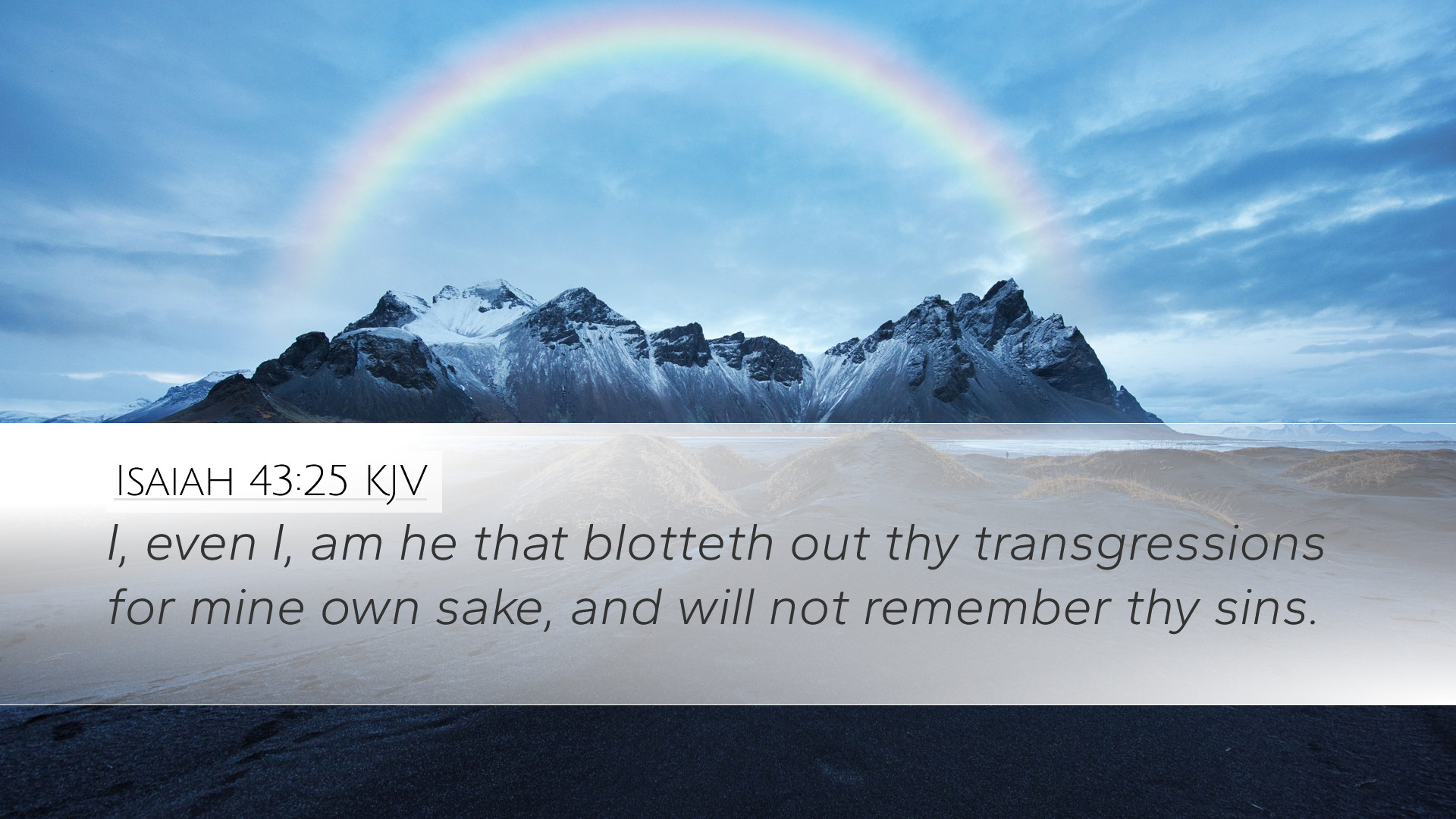Commentary on Isaiah 43:25
Verse: "I, even I, am he that blotteth out thy transgressions for mine own sake, and will not remember thy sins."
Introduction
This verse from the Book of Isaiah encapsulates one of the most profound aspects of God's character—His ability to forgive and forget sins. This commentary draws upon insights from renowned public domain scholars such as Matthew Henry, Albert Barnes, and Adam Clarke, each providing a unique perspective on the theological depths of this verse.
The Context of Isaiah 43
Isaiah 43 serves as a powerful reminder of God’s covenant relationship with Israel. The passage speaks to God’s promises amidst trials. It speaks to a future restoration and deliverance for His people, emphasizing both His sovereignty and mercy.
Matthew Henry's Insights
Matthew Henry highlights that this verse is a declaration of God’s mercy toward His people. He emphasizes the personal nature of divine forgiveness: "I, even I, am he..." disenfranchising other deities and establishing God's uniqueness in the sphere of salvation.
- Blotting Out Transgressions: Henry points out that the term "blot" signifies a complete erasure. As a scribe would erase ink from a record, God wipes the slate clean concerning our sins.
- For Mine Own Sake: This phrase underscores God's motive for forgiving sin. He acts not merely out of obligation but from His own nature, embodying grace and truth.
- Not Remembering Sins: This aspect reflects the covenantal promise that God's people are no longer defined by their past failures, but by His grace and redemption.
Albert Barnes' Perspective
Albert Barnes offers an exposition on the implications of divine forgiveness. He frames the verse within the overarching theme of God's redemptive purpose.
- Nature of Divine Forgiveness: Barnes notes that the forgiveness mentioned is total and unequivocal. God’s act of forgiveness encompasses all transgressions, indicating the depth of His mercy.
- Reasons for Forgiveness: Barnes elaborates on the phrase "for mine own sake," suggesting that God's forgiveness is connected to His glory and the fulfillment of His purpose. It serves the grand design of salvation history.
- Promise of No Remembrance: The notion of divine forgetfulness signifies liberation from guilt. Barnes highlights that this invitation to a fresh start is a profound counseling to believers who struggle with self-condemnation due to past sins.
Adam Clarke's Commentary
Adam Clarke brings an analytical depth, considering the historical and prophetic elements intertwining within the text. He emphasizes the continuity of God's promise from the Old to the New Testament.
- Historic Context: Clarke situates this verse within Israel's journey, revealing that despite entrenched rebellion, God’s love endures, tweaking the narrative of judgment towards one of hope and restoration.
- Clarity in Divine Assurance: He notes that assurance from God, "I will not remember thy sins," provides peace of mind for believers, reinforcing that true repentance is met with divine grace.
- Comparative Analysis: Clarke draws parallels with New Testament teachings, linking the verse to Jesus’ redemptive work on the cross, affirming that through Christ, believers receive the ultimate assurance of forgiveness.
The Theological Significance
Isaiah 43:25 touches upon several critical theological doctrines:
- Doctrine of Forgiveness: This passage affirms that God is willing and able to forgive, a cornerstone of Christian belief that assures followers of His grace.
- Covenantal Theology: The text illustrates God’s commitment to His people, demonstrating the relational aspect of faith that transcends mere ritual or law.
- Importance of Repentance: Implicitly, the verse encourages believers toward genuine repentance, asserting that acknowledging sin leads to experiencing God’s forgiveness.
Application for Today's Believers
For contemporary Christians—pastors, students, theologians, and scholars—Isaiah 43:25 offers essential applications:
- Embrace of Forgiveness: Believers are invited to embrace the truth that past sins do not determine their identity, fostering a healthier spiritual life.
- Encouragement in Ministry: Pastors can assure their congregations of God’s loving forgiveness, providing pastoral care that reflects God’s heart.
- Academic Reflection: Scholars are encouraged to delve deeper into Old Testament theology in relation to New Testament understanding, enhancing their exegetical frameworks.
Conclusion
As we conclude this exploration of Isaiah 43:25, the message is clear: God's forgiveness is total, intentional, and transformative. In a world rife with guilt and shame, this verse paints a picture of hope and redemption that resonates across generations. By integrating the insights of Henry, Barnes, and Clarke, we gain a richer understanding of the divine character and the promise of renewal found in the heart of God.


